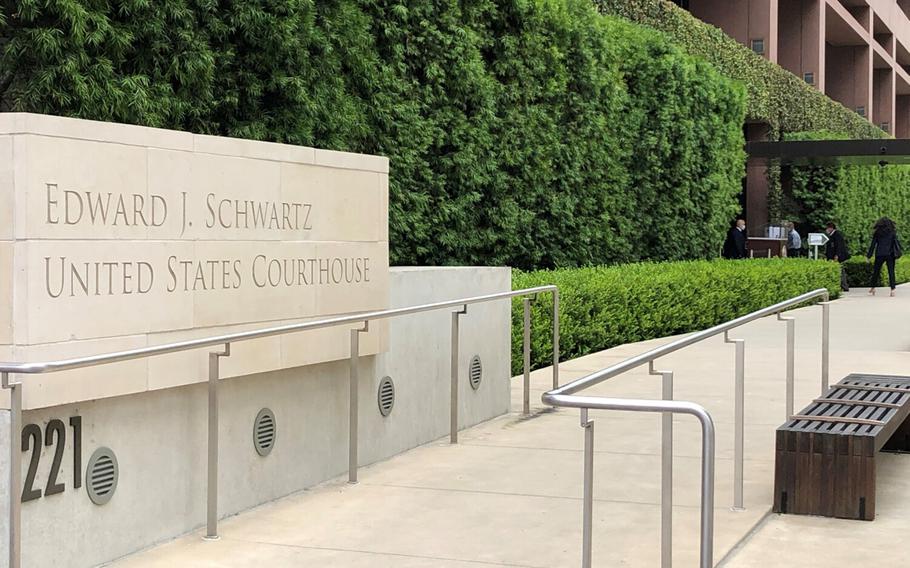
The entrance to the Edward J. Schwartz U.S. Courthouse in downtown San Diego. (Kristina Davis/San Diego Union-Tribune/TNS)
SAN DIEGO (Tribune News Service) — A hearing to determine if prosecutors in the “Fat Leonard” Navy bribery trial improperly withheld evidence has been postponed a day to give time for defense attorneys to continue to sift through hundreds of pages of discovery handed to them over the past few days.
The discovery — mostly emails and messages — included new evidence indicating investigators received authorization to pay prostitutes up to $5,000 in “reward” money to come to San Diego to testify in the case.
Five former U.S. naval officers are on trial, accused of taking bribes — including the services of prostitutes in Southeast Asian ports — from Singapore-based military contractor Leonard Glenn Francis, who is nicknamed for his immense physique. The trial, in its ninth week, is supposed to be the culmination of a sprawling investigation, spanning more than a decade, into the Navy’s worst corruption scandal in modern history.
Evidence regarding the prosecution’s overseas searches for prostitutes linked to the investigation, and any subsequent interviews with them, are at the center of the latest controversy in the case.
Late last week, defense attorneys accused federal prosecutors of failing to turn over exculpatory evidence that casts doubt on a sexual tryst between a prostitute and one of the defendants, former Capt. David Lausman. Specifically, Naval Criminal Investigative Service agents failed to draft a report of their interview with the sex worker, named Ynah, in which she denied the intimate encounter.
Prosecutors acknowledged that the NCIS agent should have created the report but argued there was not a discovery violation because the interview with Ynah was too vague to be exculpatory. Plus, a private investigator for the defense had interviewed her first and elicited greater detail from her, they said.
Testimony was put on hold in preparation for an evidentiary hearing to happen Monday outside of the presence of the jury to determine if prosecutors violated the Brady Rule, named after the 1963 U.S. Supreme Court case Brady v. Maryland, which requires exculpatory evidence to be turned over.
In the meantime, prosecutors were ordered to deliver to the defense any additional evidence, including emails and messages among agents and prosecutors, regarding communications about their search for prostitutes to interview, as well as any other unrelated discovery items that may have fallen through the cracks.
That resulted in hundreds of pages of evidence sent to defense teams over the past few days, including 450 pages Sunday night and five reports Monday morning. Much — but not all — of the discovery was duplicative in nature. Still, defense attorneys would need more time to prepare.
“I stopped reading at midnight,” Robert Boyce, a defense attorney for Lausman, told the judge Monday morning.
Attorneys also raised another specter found in the batch of new discovery: emails between agents discussing that they had received authorization from NCIS to pay prostitutes up to $5,000 to travel to San Diego to testify for the prosecution. If such payments were offered, it doesn’t appear anyone accepted.
The new information raises the question, defense attorneys told the judge: Was the same offer made to Ynah — the prostitute who denied having sex — or only to those whose narratives supported the prosecution’s?
The issue of cash offers, and evidence as to what the official guidelines are for NCIS to procure such funds, will be part of the hearing that is now set to begin Tuesday. It will likely take longer than a day.
U.S. District Judge Janis Sammartino has ordered the U.S. Attorney’s Office to provide a “taint” prosecutor — someone in the office with no ties to the case — to represent the government during the Brady hearing, to avoid the possibility of witness contamination and to act as a separate layer should one of the prosecutors on the team be called to the witness stand.
Asking prosecutors to testify comes with its own potential confidentiality and professional responsibility roadblocks.
“It’s probably unprecedented, in my experience, having prosecutors get on the stand in the middle of trial,” Assistant U.S. Attorney Peter Ko, chosen as the taint counsel, told the judge Monday.
“Nothing about this case is routine,” Sammartino replied dryly.
©2022 The San Diego Union-Tribune.
Visit sandiegouniontribune.com.
Distributed by Tribune Content Agency, LLC.